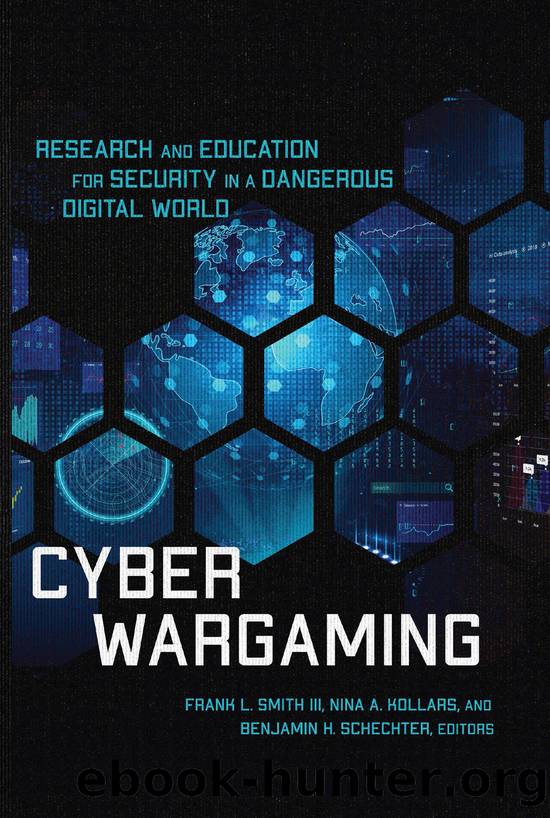Cyber Wargaming by Frank L. Smith III;Nina A. Kollars;Benjamin H. Schechter;

Author:Frank L. Smith III;Nina A. Kollars;Benjamin H. Schechter;
Language: eng
Format: epub
Publisher: Georgetown University Press
Published: 2023-09-26T00:00:00+00:00
Pedagogy
In educational settings, the more engaged participants are in a learning activity, the greater the chance that lessons will be received and retained. Engagement can be generated by activities that require active participation, rather than passive absorption, and contain a sense of fun.32 Indeed, according to Dan Rea and colleagues, fun activities are not only an instrument of learning success but also âlearning satisfaction.â33 Reinforcing this point, Bob Stremba and Christian Bisson note that âthe idea of using play as a valid form of pedagogy has been substantiated by many scholars.â34 In studies of serious games, students having fun has been linked to âhigher interest in the subject matter.â35 Fun also offers opportunities to overcome reluctance to participate in âlong, complex and difficultâ learning processes, several of which are described in this book.36
One complement to playfulness in learning is humor. Humor is perhaps most simply understood as that which âis actually or potentially funny, and the process by which this âfunninessâ occurs.â37 According to Jerry Palmer, it is also dependent on a âplayful state of mindâ shared between humor maker and audience, which means that humor shares a core characteristic of playfulness as defined by Salen and Zimmerman.38 Humor is a fundamentally human trait; Simon Critchley goes as far as to suggest that Huizingaâs homo ludens argument was erroneous, and that instead âwe are homo ridens, laughing beings.â39 Academic debate notwithstanding, playfulness and humor appear inextricably linked to the human condition.
Humor has been recognized as an important element in several pedagogical fields.40 The same is true for ludology.41 Humor even appears in security studies; as Carol Cohn finds, it can be a prominent toolâbe it wry or perverseâfor managing if not dulling the gruesome parts of imagining war.42 However, humor is almost entirely absent from the literature on wargaming. Many foundational books in the field rarely if ever refer to the subject.43 Perhaps this omission is further evidence of the uneasy relationship between playfulness and professional wargaming. But it is still strange. Studies in adjacent fields such as pedagogy and technology, cited above, show that humor can break down barriers between players and games, and between students and teachers, while increasing participantsâ engagement. There is good reason to suspect similar benefits for educational wargaming, even if this possibility has been understudied to date.
I have seen first-hand that playersâ engagement, emotion, entertainment, and humor can serve as vehicles for student learning through cyber wargames. I have also grappled with potential trade-offs, as described in chapter 2, between playersâ engagement and other values, such as contextual realism. Despite these dilemmas of design, I argue that the educational benefits of engaging play are well worth the effort.
Download
This site does not store any files on its server. We only index and link to content provided by other sites. Please contact the content providers to delete copyright contents if any and email us, we'll remove relevant links or contents immediately.
The Secret History by Donna Tartt(16676)
The Social Justice Warrior Handbook by Lisa De Pasquale(11495)
Thirteen Reasons Why by Jay Asher(7808)
This Is How You Lose Her by Junot Diaz(5803)
Weapons of Math Destruction by Cathy O'Neil(5055)
Zero to One by Peter Thiel(4840)
The Myth of the Strong Leader by Archie Brown(4796)
Promise Me, Dad by Joe Biden(4460)
Beartown by Fredrik Backman(4443)
How Democracies Die by Steven Levitsky & Daniel Ziblatt(4427)
Stone's Rules by Roger Stone(4426)
The Fire Next Time by James Baldwin(4354)
100 Deadly Skills by Clint Emerson(4091)
A Higher Loyalty: Truth, Lies, and Leadership by James Comey(4044)
Rise and Kill First by Ronen Bergman(4026)
The David Icke Guide to the Global Conspiracy (and how to end it) by David Icke(3899)
The Farm by Tom Rob Smith(3883)
Secrecy World by Jake Bernstein(3793)
The Doomsday Machine by Daniel Ellsberg(3742)
